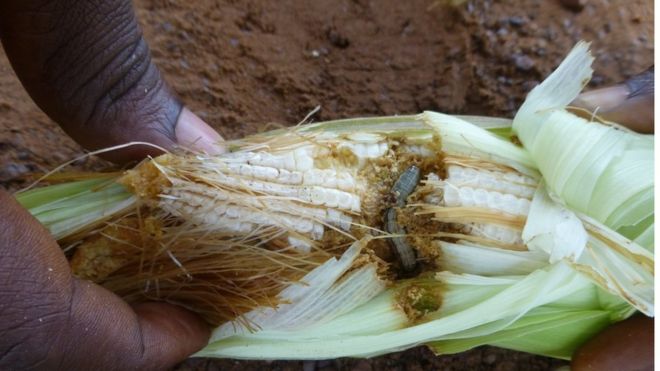Fall armyworm 'threatens African farmers' livelihoods'

Researchers are calling for earnest activity to end the spread of a bug that is devastating maize products is spreading quickly crosswise over Africa.
The fall armyworm represents a noteworthy risk to nourishment security and agrarian exchange, cautions the Center for Agriculture and Biosciences International (Cabi).
It says ranchers' employments are at hazard as the non-local hatchlings debilitates to achieve Asia and the Mediterranean.
The Food and Agriculture Organization arranges crisis chats on the issue.
The armyworm, purported on the grounds that it eats its way through the vast majority of the vegetation in its way as it walks through products, is local to North and South America however was recognized without precedent for Africa a year ago.
Cabi boss researcher Dr Matthew Cock stated: "This intrusive species is presently a genuine irritation spreading rapidly in tropical Africa and with the possibility to spread to Asia.
"Dire activity will be expected to forestall obliterating misfortunes to yields and ranchers' jobs."
Researchers think the caterpillar or its eggs may have achieved the landmass through imported create.
Once settled in a region, the grown-up moths can fly extensive separations and spread quickly.
Armed force worm caterpillarImage copyrightCABI
Picture subtitle
The caterpillar can walk like an armed force over the scene
Dr Jayne Crozier, of Cabi, said the armyworm's nearness had now been affirmed in west Africa and was thought to be available in the south and east of the landmass, many parts of which transfer on maize for their staple eating routine.
"It's conceivably been there for quite a while and it's creating a ton of harm now," she revealed to BBC News.
"The current disclosure of fall armyworm in Africa will be a tremendous risk to nourishment security and furthermore to exchange the locale."
The FAO is to hold a crisis meeting in Harare in the vicinity of 14 and 16 February to choose crisis reactions to the armyworm risk.

Post a Comment